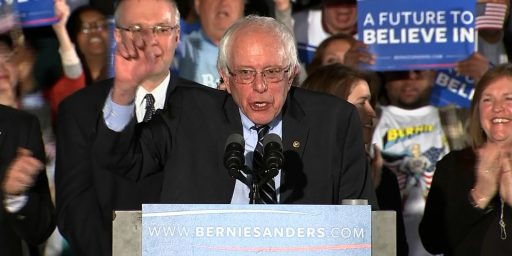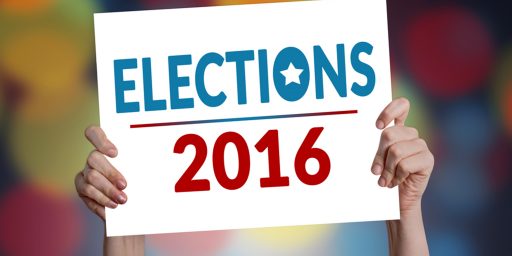Democrats Punt on Primary Order
They're going to wait until after the midterms to decide whether Iowa and New Hampshire stay at the front of the line.

WaPo (“Democrats delay early state order decision for 2024 campaign“):
The Democratic National Committee delayed a decision Saturday on a new order for early state voting in the 2024 presidential elections until after the midterm elections this fall. The order of early states had been scheduled for final debate and a decision next weekend, but disagreements in the committee and continued uncertainties, including a question of Republican cooperation in some states, led the committee to push the date.
“Following the midterm elections, we will reconvene to update our evaluation of the applicant pool and work toward a final decision to present to the full DNC for a vote, which DNC leadership has assured us they will make happen as soon after the midterm elections as is possible,” the chairs of the Rules and Bylaws Committee, Minyon Moore and Jim Roosevelt Jr., wrote to members Saturday in a memo obtained by The Washington Post.
Some Democrats were concerned that a decision before the midterm elections could have an adverse affect on Democratic campaigns this year. Both Nevada and New Hampshire, which are making plays to be the first 2024 primary contest, have contested Senate contests at stake in November. Officials in Michigan and Minnesota, which have contested gubernatorial contests, were hoping to move up their primaries.
“Several states were saying it could cost them Senate seats,” said a Democrat involved in the process who, like others interviewed for this story, spoke on the condition of anonymity to describe internal discussions. “The elections are making it too complicated.”
Complicating matters further is the continued resistance of Republicans in Minnesota and Michigan to publicly commit to moving those state primaries earlier, which Democrats would likely need to allow those states to join the first weeks of voting. The DNC Rules and Bylaws Committee also must decide whether to allow Iowa to remain in the early voting order, and what the consequences should be for candidates and states that disobey the party calendar.
A party official familiar with the process said that Democratic leadership wanted to make sure the party was not distracted from the midterm elections. There are 17 state and territory applicants still in the running for four or five spots in the early nominating calendar. Officials close to the process expect at least three of the traditional early voting states, which are Nevada, New Hampshire and South Carolina, to retain spots, though the order is unclear.
CNN (“Democratic National Committee to delay rules committee vote on early state calendar“) adds:
The source familiar said the decision to delay the vote was made because of a host of outstanding questions, including how each election would be administered and the feasibility of each primary day.
The source added Democrats want to make sure the focus stays in the midterms and not the 2024 nominating process.[…]
Last month, Colorado, Connecticut, Delaware, Georgia, Illinois, Iowa, Maryland, Michigan, Minnesota, Nevada, New Hampshire, New Jersey, Oklahoma, Puerto Rico, South Carolina, Texas and Washington made presentations to the Rules and Bylaws Committee detailing why they should be among the first states to hold presidential nominating contests in the next presidential election.
At the time of the presentations, the focus was especially on Iowa, which was proposing dramatic changes to its complicated system as it aimed to maintain its “first in the nation” status in the face of criticism of the caucus process and of the state’s lack of diversity and competitiveness at the presidential level.
Because the Democratic Party is aiming to have every region of the country represented among the early group of states, and the positions of New Hampshire, Nevada and South Carolina are generally considered to be secure, it’s expected there will be fierce competition among other Midwestern states to be the alternative to Iowa. Minnesota, Michigan and Illinois are jockeying for the spot, but all three bids have potential problems of their own.
The absurdity of having candidates spend a year eating pancakes in Iowa diners and hanging out in the living rooms of New Hampshirites engaging in “retail politics” has been a long-running theme here at OTB. I’ve been arguing for a national primary since at least January 2007. To the extent Democrats are at least having a conversation about upending this broken system, good on them.
That they’ve flinched at making the move right before the midterm elections, perhaps giving Republicans in swing Senate races an important talking point, is not exactly the height of courage. After all, democracy involves telling the voters what you would do if elected and letting them decide whether to elect you with that knowledge. At the same time, I absolutely get it.
Both parties have tried to let Iowa, New Hampshire, and South Carolina keep their place of primacy, threatening to simply not count the votes in states that dare try to jump the queue. Given that the nomination is often all but wrapped up by the time the voting in the latter is over, though, that has proven unsustainable. Florida, in particular, has frequently thumbed their nose at the system—even violating their own pledges to party leaders—and dared the parties to punish them and risk losing a crucial large swing state.
If we’re not going to move to a national primary with a run-off—again, my longstanding preference—on the grounds that it’s too expensive or makes it impossible for lesser-known candidates to build momentum, we should at the very least have a rotating system. Maybe have four or five primaries, each of which has a somewhat representative basket of states, and then alternate the order in which they’re held each quadrennial.





Well, if Iowa’s loses it’s first in the nation primary status, that’s going to have a huge impact on its tourism income. They might have to sell “Devin Nunes’ Twitter Cow” T-shirts and stuff.
Then again, who doesn’t like the awkward photos of Ted Cruz trying not to look like he’s deep throating a corn dog at a state fair?